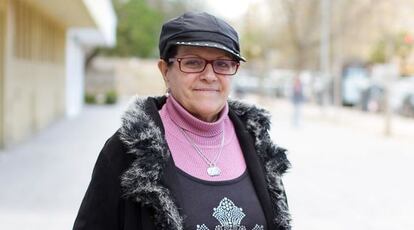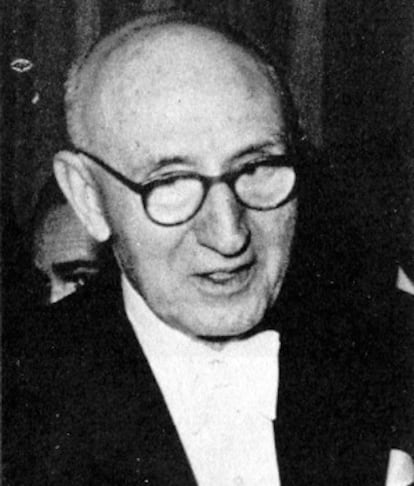Was my father a millionaire banker?
Ana Gallart has won the right to have financier Juan March exhumed

Ana Gallart wears two chains with two identical Virgin of Monserrat medallions around her neck. One is hers; the other belonged to her twin sister. Both were given to her when she was adopted and she touches them several times during the interview.
For four years now, 65-year-old Gallart has been trying to uncover the identities of her biological parents. And everything, she says, points to the famous financier Juan March, who died in 1962 having, under Franco's protection, grown to become the most successful banker in Spain in the first half of the 20th century.
Gallart's phone has not stopped ringing for the last two days. "Now it has stopped a little bit," she says after answering a few questions for live radio.
Drinking a coffee on the terrace of a modest bar on her street, in a working-class neighborhood of Valencia, she explains how she ended up concluding that her father was the famous Mallorcan businessman.

"I think," she says, "that I am his daughter."
Gallart says she went through most of her life unaware that she had been adopted, but admits she first started to suspect something when she requested her birth certificate prior to getting married. The document states that she was the daughter of "unknown parents."
At the time, Feli and Víctor, her adoptive parents, asked her not to investigate her biological family out of fear they would claim her and she would leave them, she says.
But now Gallart has decided to get to the bottom of the situation. Feli is now 96 and suffering from senile dementia, which prevents her from being aware of what is going on.
"I thought that's enough: I want to know who I am, who my biological parents were, and where I come from," Gallart explains.
After going to court in Palma de Mallorca and obtaining permission to look at her files, she discovered a year ago that her biological mother was called Rosa and had died at the age of 62. Gallart never knew her or her two children, who have also died.
"I got there too late to meet many people," she says.
It seems that on December 23, 1947, Rosa, who worked as a cook in the March family home, gave birth to two girls in Palma de Mallorca; Ana María and María Rosa, whom she had to leave in a foundling hospital.
There are some who see her request as an attempt to claim part of a great fortune
According to Gallart, the father of the twin girls was Juan March. Eight months after she was born, María Rosa died and little Ana was later given up for adoption at the age of two and a half.
Now, after years of red tape, she has achieved something unusual: to have the body of Juan March exhumed and his DNA analyzed.
Gallart says she has invested almost 10,000 euros in legal procedures alone. Her non-contributory pension, her husband's early retirement pension and her mother's widow's pension are not enough to cover either the massive lawyers' bills, the advance payments for the costly exhumation, or the numerous trips she has made to Palma de Mallorca over the years - where she has moved heaven and earth to find the evidence that gives meaning to what she understands is her past.
Her children, her friends and the people who value and believe in her cause have lent her the money - knowing they would not get it back - to allow her to finally learn if her investigation has born the fruit for which she hoped.
March's remains were exhumed last Thursday in order to carry out the DNA test that will solve the enigma. The results will be known in the coming weeks.
But there are those who see in the request not just a woman's desire to know who her father was, but also an attempt to claim part of a great fortune.
Gallart admits that if the tests yield a positive result then part of the millionaire Juan March's legacy might belong to her.
That's why if it is confirmed that the banker was her father, she will change her surname in order to be able to apply for the inheritance and, what's more, close the book on a chapter of her life that still remains open.
Tu suscripción se está usando en otro dispositivo
¿Quieres añadir otro usuario a tu suscripción?
Si continúas leyendo en este dispositivo, no se podrá leer en el otro.
FlechaTu suscripción se está usando en otro dispositivo y solo puedes acceder a EL PAÍS desde un dispositivo a la vez.
Si quieres compartir tu cuenta, cambia tu suscripción a la modalidad Premium, así podrás añadir otro usuario. Cada uno accederá con su propia cuenta de email, lo que os permitirá personalizar vuestra experiencia en EL PAÍS.
¿Tienes una suscripción de empresa? Accede aquí para contratar más cuentas.
En el caso de no saber quién está usando tu cuenta, te recomendamos cambiar tu contraseña aquí.
Si decides continuar compartiendo tu cuenta, este mensaje se mostrará en tu dispositivo y en el de la otra persona que está usando tu cuenta de forma indefinida, afectando a tu experiencia de lectura. Puedes consultar aquí los términos y condiciones de la suscripción digital.








































